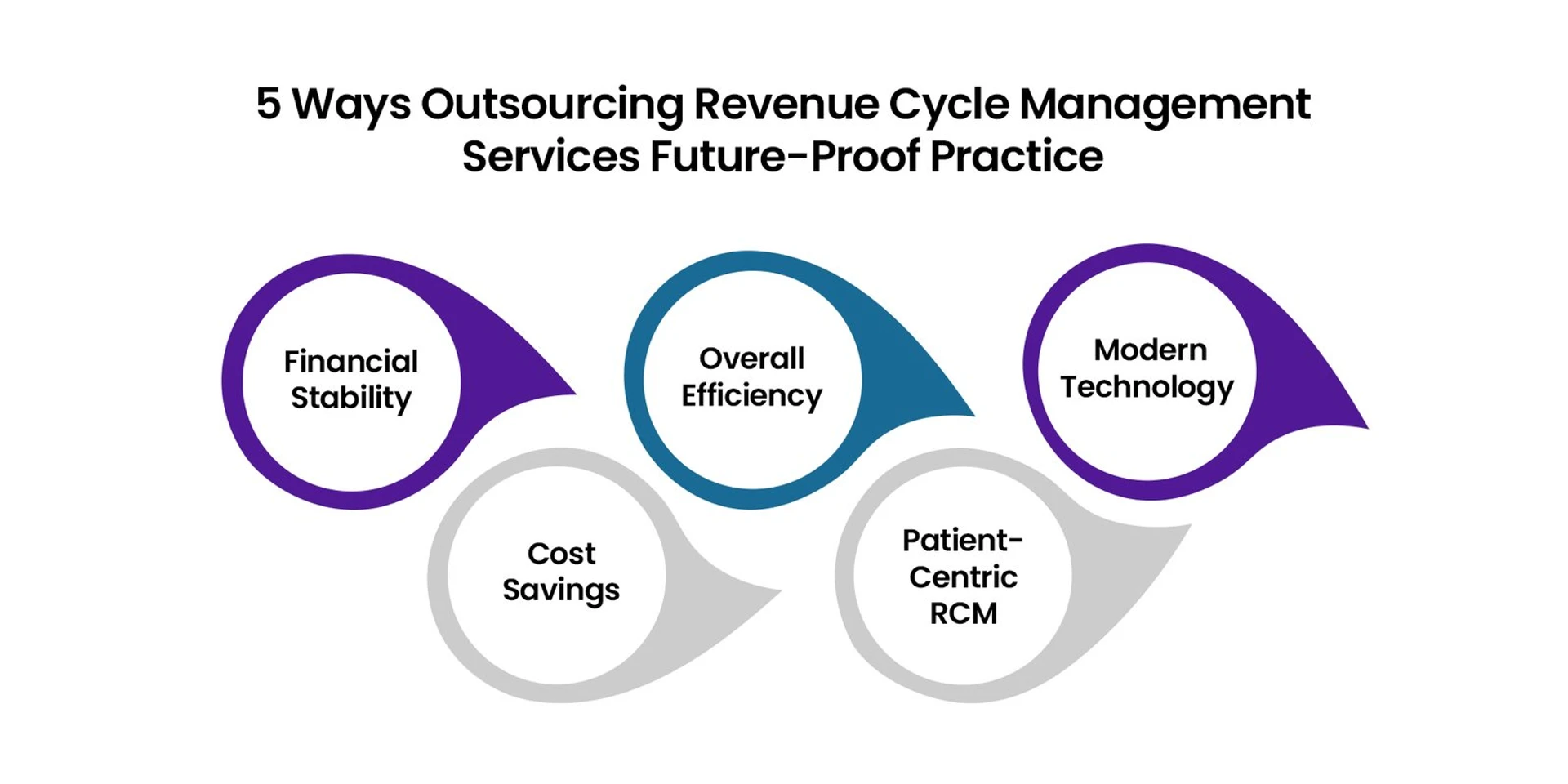Ever wondered what the backbone of healthcare financial operations is? Yes, it is the revenue cycle management, commonly abbreviated as RCM, an important process that makes certain that healthcare organizations and providers get paid for their services.
Now, the complexity of these operations is better known. According to a recent industry report, these are the top five RCM challenges as stated by the providers:
- Timely patient collections
- Managing denials
- Hiring and training staff
- Data analytics and reporting
- Maintaining security and compliance
One thing is clear—RCM management is no easy task, certainly because more than getting paid, it is about seamless optimization of clinical and administrative functions. This is when outsourcing revenue cycle management services fits into the picture.
This blog briefly discusses the meaning, importance, and benefits of outsourcing these services.
Understanding Outsourcing Revenue Cycle Management Services
The Growing Importance of Outsourcing RCM Services
It is no news that the healthcare landscape is constantly changing, so is the complexity in revenue cycle management. However, many recent surveys showcase staggering growth of outsourcing RCM services among healthcare organizations across the globe.
The question may arise—why are practices considering outsourcing? The strong reasons to do so might be:
- Reduce expenses
- Improve cash flow
- Transition into value-based care models
Outsourcing RCM has become a strategic solution in itself. It is no longer about keeping up with the present but also about future-proofing your practice in a healthcare ecosystem that is getting more complex day-by-day.
5 Ways Outsourcing Revenue Cycle Management Services Secures Your Practice

The benefits of outsourcing revenue cycle management services are many but here are the top five ways it can future-proof your practice:
Ensures Financial Stability
Given the complex regulatory landscape, maintaining financial stability of the practice is not easy. Therefore, outsourcing RCM services can help you achieve that stability effortlessly.
Here’s how they do it:
- Predictable Cash Flow: RCM partners utilize advanced analytics to foresee the revenue cycle trends more accurately. This, in turn, enables practices to plan smartly, manage resources efficiently, and make informed decisions on investments and expansions.
- Reduced Bad Debt: Expert RCM services use advanced strategies and technologies for collection and patient engagement, hence reducing the occurrence of bad debts. With healthcare costs continuing to rise, this factor can help in maintaining good fiscal health.
- Adaptability to Payment Models: With healthcare industry prioritizing more on value-based care, RCM outsourcing partners are already equipped with knowledge and tools related to such new payment landscapes to make revenue streams strong for healthcare organizations, no matter how the payment models change.
Facilitates Cost Savings
Cost efficiency will remain a necessity in the future and outsourcing revenue cycle management services can be a game-changing step towards it:
- Eliminated Infrastructure Costs: Outsourcing RCM services simply means no hefty investment in RCM software, training, and hardware as outsourcing partner takes care of every single task.
- Scalable Without Overhead: When practice grows, the RCM needs also equally increase. Outsourcing helps to scale according to these growing needs without any in-house team expansion. From hiring expenses to the struggle of retaining skilled RCM professionals, outsourcing also cuts down all the labor costs.
Boosts Overall Efficiency
Operational efficiency will be equally vital in the time ahead and RCM consulting can help achieving this in the following ways:
- Automation of Routine Operations: The best part of outsourcing RCM services is that healthcare organizations can optimize tedious operations such as prior authorization, claim scrubbing, and follow-ups, thereby making the entire billing cycle faster and cutting down human errors.
- Faster Claim Processing: Outsourced RCM partners with the help of a dedicated team and advanced technology can drastically reduce the time between service provision and payment receipt by streamlining the revenue cycle, leading to increased cash flow and financial stability.
- Continuous Process Improvement: RCM partners keep updating their processes to align best practices from within the industry and ensure most effective billing processes to the organization.
Enables Patient-Centric RCM
Outsourcing revenue cycle management services can benefit in improving patient experience:
- Transparent Billing Processes: Most RCM partners have patient portals and clear communication channels, which makes billing clearer and easier for patients.
- Flexible Payment Options: When patient responsibility for healthcare costs rises, providing patients with different payment plans becomes necessary. RCM partners often have multiple payment options to enhance patient satisfaction and collection rates.
- Reduced Billing Errors: Outsourced RCM services prevent patient frustration and ensure positive patient relationships by minimizing errors in the billing process, which is a key in today’s competitive healthcare market.
Leverages Modern Technology
Staying ahead in the technology race is another task for individual practices today. Fortunately, outsourcing revenue cycle management can keep you abreast:
- Access to Advanced Analytics: RCM partners invest in data analytics capabilities that offer practices vital data to understand their financial performance better.
- Integration with Emerging Technologies: With technologies such as artificial intelligence (AI) and blockchain impacting healthcare finance, outsourcing partners utilize these innovations for smooth and future-ready practice.
- Cybersecurity and Data Protection: Digital threats are increasing, making strong cybersecurity the need of the hour. The security measures implemented by RCM outsourcing partners are usually advanced, ensuring that financial data and patient information remain protected against evolving cyber threats.
Parting Thoughts
Looking at the current evolving landscape of healthcare, there is no denying that RCM outsourcing is here to stay. Outsourcing revenue cycle management services may simply be a trend or strategic technique today, but it will slowly become an indispensable factor for successful healthcare RCM tomorrow.
So, the question is not whether you can afford to outsource RCM, it is if you can afford not to. The time to future-proof your practice is now, and RCM outsourcing is your key to unlocking a world of possibilities in the ever-evolving healthcare landscape.






